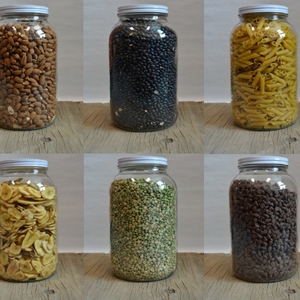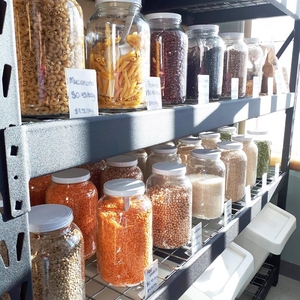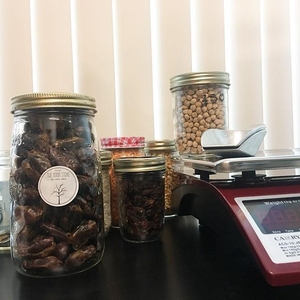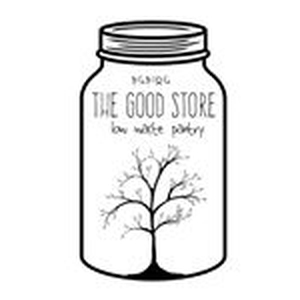The Good Store
University of Northern British Columbia, Prince George Public Interest Research Group
Project Overview
The Good Store is a low waste shop established on the UNBC campus to provide all members of the community with access to affordable, healthy and sustainable food options. The store is stocked with a range of "pantry staple" items, snack foods and personal items; all products have minimal or no packaging. Customers can bring their own bags or containers to fill, but if they do not have their own reusable containers they are provided with glass jars free of charge, making low waste shopping simple and affordable.
Background
In November 2017, Bridie Kafrissen (Local Foods Coordinator for PGPIRG) and Arctica Cunningham (Executive Director of PGPIRG) began brainstorming ways to improve UNBC students’ access to affordable, sustainable food sources. They identified three key challenges to sustainable food accessibility on campus: a lack of food procurement options on campus (especially for unprocessed foods), a lack of transportation options to off-campus grocery stores, and the high cost associated with sustainable food options at retail outlets.
Over the following months, a business proposal was hatched to create a low-waste and sustainable bulk food store, to be located in the PGPIRG Office on the UNBC campus. The store was built on the concept of sustainability (focusing on low waste principles) rather than incorporating sustainable initiatives after it had been established, as reducing our environmental impact is imperative and should be foundational to all new business ventures. The name “The Good Store” was chosen for its simplicity, with the implicit connotation that the store would only sell food products with minimal environmental impact, i.e. largely plant-based items with minimal or no packaging.
Goals
The objective of this project was to promote a low waste and sustainable food lifestyle through accessibility, affordability and education. Creating a store on campus where the campus community could purchase “pantry staples” (e.g. beans, pasta, flour) at affordable bulk prices increases food security for the UNBC community, as before the Good Store, only prepared foods were available for purchase on campus. Furthermore, by providing members of the UNBC community with low cost bulk food shopping options on campus, it would alleviate the need for traveling into town for grocery shopping.
Implementation
The PGPIRG Local Foods Coordinator and Executive Director worked together to develop a business plan and submit an application for funding from the UNBC Green Grants program. After the funding request was approved, Arctica worked throughout the summer of 2018 to prepare a space for the store, and receive the necessary health and safety approvals. The project was endorsed as part of the strategic direction for PGPIRG, with the organization providing staff time and resources to support the store.
Timeline
- November 2017: Brainstorming of the ‘The Good Store’ concept by the PGPIRG Local Foods Coordinator and Executive Director.
- January 2018: PGPIRG submits a funding proposal to the UNBC Green Grants program.
- April 2018: The project receives conditional funding for the Green Grant request, subject to approval of the project from Northern Health (the local government health authority) and UNBC Risk and Safety.
- July 2018: The PGPIRG Office is reorganized to make room for the store, and UNBC Facilities installs laminate flooring (to meet Health and Safety requirements).
- August 2018: Northern Health approves the business and safety plans for the store.
- September 2018: UNBC Risk and Safety approves the business plan for the store, and PGPIRG receives funding to start setting up the space.
- October – December 2018: Shelving, storage containers, scale, etc. are purchased.
- January 2019: After much searching for a product supplier, PGPIRG is approved for an account with Gordon Food Services, and order the initial inventory for the store. Products are priced to be competitive with local grocery stores, but with a small mark-up to allow for revenue to support the on-going costs of operation.
- February 2019: The Good Store officially opens, coinciding with UNBC’s ‘Green Day’, an annual event to celebrate, communicate and consult on sustainability initiatives with UNBC and the broader Prince George community.
Financing
Start-Up Costs: * Equipment (shelving, containers, scale, etc.): $1,700.00 * Marketing (logo design, stickers, posters, etc.): $650.00 * Business Expenses (business license fee, cash drawer, etc.): $200.00 * Inventory: $2,500.00 * Student Coordinator Wages: $1,500.00 * Executive Director Wages: In-Kind Donation from PGPIRG
The initial costs of the project were financed by a $5000 Green Grant, which is a UNBC program designed to provide seed funding for new sustainability initiatives on campus.
Recurring costs, including inventory replenishment and the student coordinator wage are covered by a 30% (average) mark-up placed on Good Store products.
UNBC was very accommodating for the establishment of this project, installing new flooring and some other upgrades to the space free of charge. Also, PGPIRG is not charged a rental fee for its office space, which further reduces costs for the business. Therefore, depending on the location and level of support at other institutions, the business expenses and start-up costs may be much higher.
Moreover, as the store was established and is managed through PGPIRG, there is more consistency to ensure the long-term success of the project. The organization has the financial stability to be able to take moderate risks, such as bringing in new inventory and hiring staff, and can cover those business expenses until revenue from sales catches up to the expenditure. This is a student-led project, but it is made possible through the support of these organizations on campus.
Results
We have seen a warm response from the community towards The Good Store, and hope to continue building on our success throughout the summer and into the new school year. Community members have supported the store’s low waste goals by donating used glass jars, which we have sanitized, and provide to customers free of charge. As a result, not only is the store providing an opportunity for people to purchase bulk food products without single-use packaging, but it has addressed the greatest barrier to low waste shopping: the pre-planning that is required. At the Good Store, people can shop without plastic, even if they have not brought their own container or bag.
So far, the greatest benefit that we have observed from the project is the conversations the store has sparked around food accessibility in the community, as well as packaging waste and low waste alternatives. Many students living on campus have been frequenting the store, as the UNBC campus is not within walking distance of any grocery stores, so grocery shopping off-campus for people without personal vehicles can be time consuming and challenging. We have been able to educate people on sustainable food alternatives, such as using dried beans rather than canned, exposing customers to new ideas. Moreover, we have been able to support two local, female entrepreneurs (one a student!) who make hygiene products and beeswax wraps that give people a package-free alternative to common household items.
Moving forward, we plan to run a series of workshops to teach students and the general public about low waste concepts. We will start with basics, like how to cook with dried beans and making soup mixes from scratch. Depending on the level of interest, we will branch out to offer more in-depth workshops, like making plant-based milks and nut butters.
Lessons Learned
One of the greatest challenges with establishing the store was finding a source for the products. While we initially looked for organic and Fair Trade items, no providers were interested in delivering to us based on our location and the scale of our business. As the store continues to develop, we may be able to revisit this idea and expand to carrying more ethically-sourced products. For the time being, we purchase our items from Gordon Food Service (GFS), which is a wholesaler that sells foods to restaurants and stores. One benefit of purchasing from GFS is that we are not creating additional shipping requirements, as they are already delivering food to our campus food-service provider at UNBC three times a week, and bring our orders on the same delivery.
The products currently in the store are mostly “pantry staple” items, which are the products we felt were likely to be used by most people, and thus had a low risk of expiring before they were sold. We also offer healthy snack options (nuts, banana chips, and dried fruit) unavailable in campus vending machines, which have been very popular. We have set up a suggestion board for customers to tell us what additional items they would like to be able to purchase in the store and we are also experimenting with offering items at a wholesale rate for individuals who pre-order.




